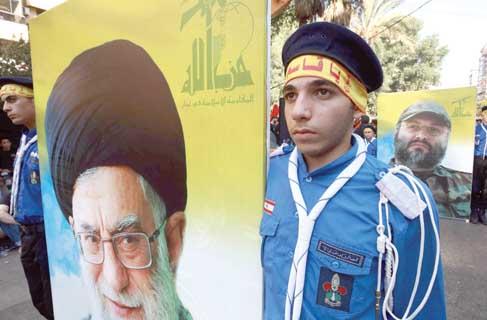
Within the context of Iran’s grip on Lebanon, the worst danger is the spread of fragility at the level of the state and its institution.
By Ali al-Amin*
Lebanon is deteriorating as a state and as an Arab country. The new stars in Lebanon are the heads of the security and military agencies, thanks to efforts by Hezbollah to push the agenda of security above all else.
If Hezbollah brought security to the forefront of the Lebanese scene, it was not to stand up to external threats but to confront Lebanon’s cultural and political diversity.
One can better understand the deterioration of public services and public institutions in Lebanon, such as the water and electricity sectors against the background of the fraying Lebanese state. These are two aspects that best illustrate the breakdown at the level of state institutions and are direct consequences of the changes occurring in Lebanon. This change must be understood within the framework of a larger project that marginalises the notion of a Lebanese entity to allow for other ideas planted in Lebanese society through intimidation and protection.
The project is to prepare for Iranian control of Lebanon.
To achieve that goal, Lebanon must be stripped of its collective identity and replace it with sectarian and religious identities. This is exactly what is happening: stirring up sectarian tensions by luring each sect and faction with the belief it can gain power and control of the country.
Lebanese President Michel Aoun and his Free Patriotic Movement (FPM) have adopted the strategy of giving Hezbollah and Iran security and diplomatic covers in exchange for assuring the FPM and its Christian coalition have a free hand in grabbing control of a maximum of internal resources.
Wanting to curb the FPM’s greed, other sects and factions seek Hezbollah’s help to protect what they perceive as their acquired rights. Thanks to power game, Hezbollah, with Iran behind it, is in the position of referee and guardian of all sects in Lebanon.
Better yet, it allows Hezbollah to fend off accusations of weakening the state and to divert them onto other forces in the country. Hezbollah profits from the internal squabbles between the sects and feeds them, while maintaining the lofty role of conciliator whenever it suits it.
To make matters worse, media in Lebanon are also disintegrating. What is left of the media are platforms dedicated to protecting the prevailing power equation and game. Newspapers are closing and journalists are being threatened to ensure that the only relevant media are the ones serving the prevailing interests.
We can no longer talk of an independent media in Lebanon. If some platforms even appear to denounce the red lines put in place by Hezbollah, the judicial system and security apparatus in the country will make sure they won’t do it again.
The absence of hope or of the dream of a better future will not be an obstacle to maintaining Hezbollah’s grip on Lebanon. It is, rather, the absence of alternatives that would justify a popular uprising for the sake of protecting the state.
However, Iran’s project for Lebanon and the region is not sustainable. It brings about losses at the national level and cannot guarantee what may seem personal or sectarian gains. All indicators portend social and economic downfall and do not bear any glimmer of hope.
The absence of hope or of the dream of a better future will not be an obstacle to maintaining Hezbollah’s grip on Lebanon. It is, rather, the absence of alternatives that would justify a popular uprising for the sake of protecting the state.
Hezbollah has enough power to exert pressure on all parties — foes and allies alike — to bring them to form a government within hours.
It’s been five months since the election and Lebanon still does not have a government. To drive away suspicions of being the cause of the delay, Iran must demonstrate that the problem lies within the Lebanese state and society. Hezbollah has enough power to exert pressure on all parties — foes and allies alike — to bring them to form a government within hours.
Hezbollah succeeded, using threats, to prevent Saydet el-Jabal, an anti-Iran-influence group, from meeting. The topic of the aborted conference was to be “Standing up to Iran’s occupation of Lebanon.”
At the height of the civil war in Lebanon, neither the government nor any other force could prevent political or cultural activity from taking place regardless of its theme. Today, it is possible to engage in all sorts of actions against any given state or in support of any given cause, except two: Iran’s policies and illegitimate weapons in Lebanon.
Within the context of Iran’s grip on Lebanon, the worst danger is the spread of fragility at the level of the state and its institutions, the level of the sense of belonging to a single sovereign country, the level of freedoms and the level of cultural diversity and innovation characteristic of Lebanon.
However, no matter how vicious and destructive it is, Iran’s grip on Lebanon won’t kill the capacity of the Lebanese people to innovate and rebuild.
*Ali al-Amin is a Lebanese writer
THE ARAB WEEKLY

Leave a Reply
You must be logged in to post a comment.